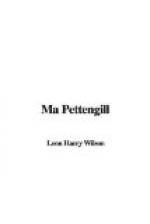As I mused upon this Ma Pettengill sorted the evening mail and to Lew Wee she now took his San Francisco newspaper, Young China, and a letter. Half an hour later Lew Wee brought wood to replenish the fire. He disposed of this and absently brushed the hearth with a turkey wing. Then he straightened the rug, crossed the room, and straightened on the farther wall a framed portrait in colour of Majestic Folly, a prize bull of the Hereford strain. Then he drew a curtain, flicked dust from a corner of the table, and made a slow way to the kitchen door, pausing to alter slightly the angle of a chair against the wall.
Ma Pettengill, at the table, was far in the Red Gap Recorder for the previous day. I was unoccupied and I watched Lew Wee. He was doing something human; he was lingering for a purpose. He straightened another chair and wiped dust from the gilt frame of another picture, Architect’s Drawing of the Pettengill Block, Corner Fourth and Main streets, Red Gap, Washington. From this feat he went softly to the kitchen door, where he looked back; hung waiting in the silence. He had made no sound, yet he had conveyed to his employer a wish for speech. She looked up at him from the lamp’s glow, chin down, brows raised, and eyes inquiring of him over shining nose glasses.
“My Uncle’s store, Hankow, burn’ down,” said Lew Wee.
“Why, wasn’t that too bad!” said Ma Pettengill.
“Can happen!” said Lew Wee positively.
“Too bad!” said Ma Pettengill again.
“I send him nine hundred dollars your money. Money burn, too,” said Lew Wee.
“Now, now! Well, that certainly is too bad! What a shame!”
“Can happen!” affirmed Lew Wee.
It was colourless. He was not treating his loss lightly nor yet was he bewailing it.
“You put your money in the bank next time,” warned his employer sharply, “instead of letting it lie round in some flimsy Chinee junk shop. They’re always burning.”
Lew Wee regarded her with a stilled face.
“Can happen!” he again murmured.
He was the least bit insistent, as if she could not yet have heard this utterly sufficing truth. Then he was out; and a moment later the two-stringed fiddle whined a little song through two closed doors.
I said something acute and original about the ingrained
fatalism of the
Oriental races.
Ma Pettengill laid down her paper, put aside her glasses, and said, yes, Chinee one fatal race; feeling fatal thataway was what made ’em such good help. Because why? Because, going to work at such-and-such a place, this here fatal feeling made ’em think one place was no worse than another; so why not stick here? If other races felt as fatal as the Chinee race it would make a grand difference in the help problem. She’d bet a million dollars right now that a lot of people wished the Swedes and Irish had fatal feelings like that.




